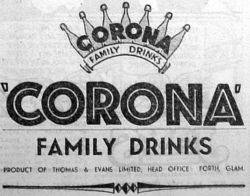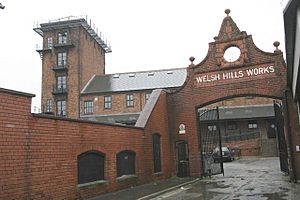Corona (soft drink) facts for kids
 |
|
| Public | |
| Industry | Drink |
| Founded | 1880s |
| Founder | William Evans, William Thomas |
| Headquarters |
,
Wales
|
|
Area served
|
Great Britain |
| Products | Corona bottled carbonated drinks |
Corona was a popular brand of fizzy drinks, also known as soft drinks. It was made by a company called Thomas & Evans Ltd in South Wales, a part of the United Kingdom. These drinks were sold all over Britain. The company started because two grocers, William Thomas and William Evans, saw that more people wanted non-alcoholic drinks.
Their first factory was in Porth, a town in the Rhondda Valley. Over time, the company grew a lot, with many factories and delivery spots across Britain. Corona was later sold to bigger companies like the Beecham Group and then Britvic. The Corona brand stopped being sold in the late 1990s.
Contents
How Thomas & Evans Started
William Thomas was born in 1851 in Mathry, a place in West Wales. He grew up on a farm. When he was 14, he started learning to be a butcher in Newport. In 1874, he got married to Rowena Rowlands. They moved to a village called Aberbeeg where he opened his own butcher's shop. His business did well, and he soon made the shop bigger.
In 1882, William Evans, who was also from Pembrokeshire, came to work for Thomas. He lived with the family for three years. The two men became business partners. They opened a chain of grocery stores. A few years later, they decided to start making soft drinks.
Evans didn't first think about making non-alcoholic drinks. But he met an American businessman. Also, more people in South Wales were joining the temperance movement. This movement encouraged people to drink less alcohol. So, Evans decided to start making fizzy drinks. Thomas helped by lending money to Evans to start this new business.
The Welsh Hills Mineral Water Factory
Their first big factory was in Porth, in the Rhondda Valley. This area was a busy coal mining region in South Wales. The factory was called the Welsh Hills Mineral Water Factory. It opened in the 1890s. It had new, modern machines for bottling drinks. It also had a special way to clean glass bottles safely. This meant bottles could be reused after customers returned them for a small deposit.
At first, the bottles used a special glass stopper held in place by a marble. This kept the fizz inside the drinks. The company first made mineral water and ginger beer. They hoped to sell these non-alcoholic options in pubs. But this didn't work very well.
Evans then had a new idea: selling drinks door-to-door. They used horses and wagons to deliver the drinks. This idea was a big success! The company started making other kid-friendly flavors too. These included orangeade, dandelion and burdock, raspberryade, and lemonade. By the early 1900s, the company had over 200 salespeople. They delivered Corona drinks by horse-drawn wagons all over Wales. They even had two huge steam-powered vehicles.
The Corona Brand Takes Off
In the early 1920s, Evans decided to give his soft drinks a new name: Corona. A new logo was created. It showed seven bottles arranged like a crown over the name. The word "corona" means crown in Latin.
The Corona brand became very popular. It grew across South Wales. At its busiest, the company had 82 delivery depots and five factories. These factories were in Porth, Tredegar, Pengam, Maesteg, and Bridgend. The horse-drawn wagons were a common sight in Wales. But in the early 1930s, they were replaced by a fleet of motor vehicles. These vehicles were easy to spot with their red and gold colors and the Corona logo. The company even had its own repair shop at the Porth factory to fix these vehicles. By 1934, the Porth depot had 74 vehicles. Three years later, that number grew to 200.
In 1934, William Evans passed away. His brother, Frank, took over as the head of the company. Under Frank Evans' leadership, the company kept growing. By the end of the 1930s, the factories in Wales were making 170 million bottles every year.
When World War II started in 1939, the government took many of Thomas and Evans' vehicles for war use. Also, there was petrol rationing. So, for a short time, they brought back the horse and wagon delivery service. After the war ended in 1945, the company went back to full production. They also brought back their motorized delivery fleet. In 1950, the company launched Tango, another popular drink that is still made today.
In 1958, the Beecham Group bought the company. They kept the Corona brand. Even though the main production stayed in South Wales, Corona delivery depots started appearing all over the United Kingdom. Under new owners, Corona reached more people. In the 1960s, British singer and comedian Dave King appeared in Corona TV ads.
As supermarkets became more popular in the late 1960s and 1970s, people changed how they shopped. Door-to-door sales became less common. In the 1970s, one of Corona's most famous ad slogans was Every bubble's passed its FIZZical! In 1987, the company was sold again, this time to Britvic. Britvic closed the Welsh Hills plant in Porth in 1987. Production then moved to Bolton in Lancashire, England.
What Happened to the Old Factory?

In the year 2000, the old Corona factory in Porth was turned into a music recording studio. It was named The Pop Factory.
 | Kyle Baker |
 | Joseph Yoakum |
 | Laura Wheeler Waring |
 | Henry Ossawa Tanner |

